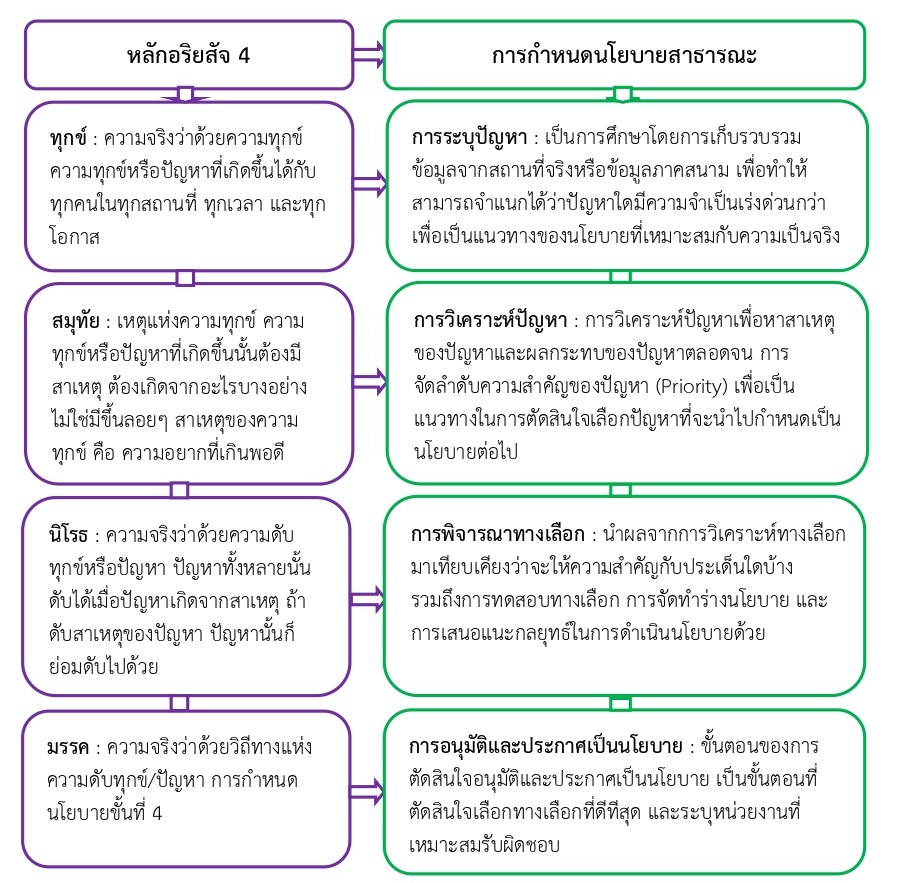THE 4 NOBLE TRUTHS AND THE PUBLIC POLICY MAKING
Keywords:
The 4 Noble Truths, Public Policy MakingAbstract
This article is a study of the Four Noble Truths and the formulation of public policy. Which have many similarities Although the Four Noble Truths are explained from the perspective of an individual in order to know and understand the laws of nature, As for determining public policy, it describes solving problems as a whole of society. If we look at the details, we will find that the policy-making process must rely on the 4 Noble Truths as the basis for formulating policies to solve problems for society as follows: 1. Dukkha is a problem that can happen to everyone in every place. At every time and every opportunity, policymaking must search for suffering, that is, identify the real problem first. 2. Samudaya: the cause of suffering. The problem must have a cause. It must come from something, namely problem analysis. Various public problems often do not arise individually but have interrelated characteristics. 3. Nirodha is the cessation of suffering. All suffering or problems can be extinguished by extinguishing the cause of the problem. Which is about the Consideration of alternatives 4. Magga is the way to end suffering/problems, that is, it is approved and announced as a policy. It is a step-by-step process where the best choice is made and identifies the appropriate responsible agency.
References
พระพรหมคุณาภรณ์ (ป.อ.ปยุตฺโต). (2552). พุทธธรรม ฉบับปรับปรุงและขยายความ. พิมพ์ครั้งที่ 11. กรุงเทพมหานคร : โรงพิมพ์มหาจุฬาลงกรณ์ราชวิทยาลัย.
มหาวิทยาลัยมหาจุฬาลงกรณราชวิทยาลัย. (2539). พระไตรปิฎกฉบับภาษาไทย ฉบับมหาจุฬาลงกรณราชวิทยาลัย. กรุงเทพมหานคร : โรงพิมพ์มหาจุฬาลงกรณราชวิทยาลัย.
เอสดีจี มูฟ. (2567). ทำไมนโยบายสาธารณะไทย (ยัง) ไปไม่ถึงความยั่งยืน?. สืบค้น 23 พฤษภาคม จาก : https://www.sdgmove.com/2021/09/07/sdg-updates-reasons-why-thais-public-policy-has-not-yet-sustainable/#_ftn1.
Anderson, J.E. (1994). Public Policy–Making: Introduction (2nd ed.). New York: Houghton Mifflin Company.
Dye, T.R. (1978). Understanding Public Policy (3rd ed.). New Jersey: Prentice Hall.
Harold D.L. & Abraham, K. (1970). Power and Society. New Haven: Yale University Press.
John E., et al. (1981). New Strategic Perspectives on Social Policy. [Subtitle]: (Pergamon Policy Studies on Social Policy series). Tropman Paperback: Pergamon Press.
Prewitt, K. & Verba, S. (1983). An Introduction to American Government. (4th ed.). New York: Harper & Row.
Sharkansky, I. (1970). The Political Scientist and Policy Analysis: An Introduction in Policy Analysis in Political Science, ed. Ira Sharkansky. Chicago: Markham Publishing Company.
William, W.B. (1975). Implementation Analysis and Assessment. Policy Analysis. 1(3), 531-566







